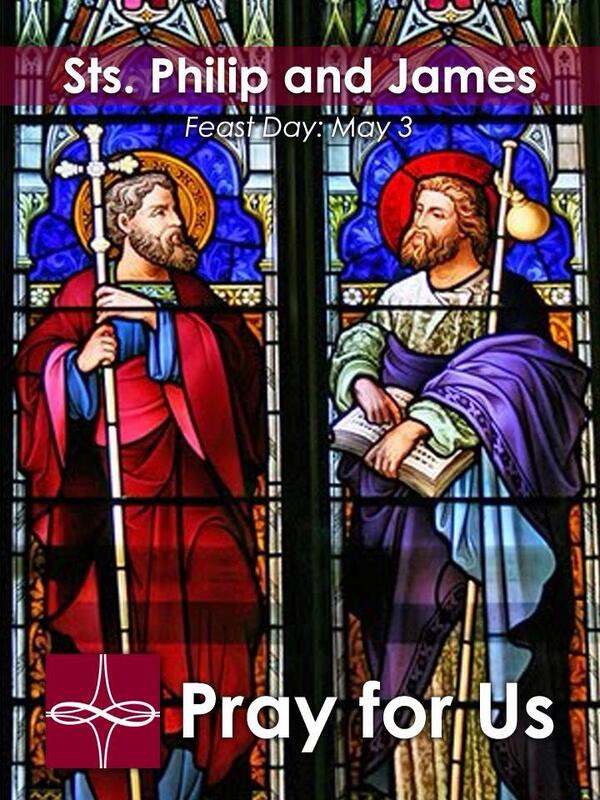 Saints Philip & James
Saints Philip & James
Image Courtesy: Young Adult Ministry Sacred Heart
(EWTN) Born in Galilee, Philip was called by Jesus Christ to be His disciple the day after St. Peter and St. Andrew and straightaway he obeyed. In Philip’s zeal and charity he sought to win Nathaniel also saying: “We have found Him of whom Moses and the Prophets did write, Jesus of Nazareth.” When Nathaniel in wonder asked, “Can any good come of out Nazareth?” Philip replied: “Come and see,” he then brought Nathaniel to Jesus. John 1:46
“In his dry but clear response,” Pope Bendict XVI says, “Philip displayed the characteristics of a true witness, he is not satisfied with the presenting the proclamation theoretically but directly challenges the person addressing him by suggestion he have a personal experience of what he had been told.”
After our Lord’s ascension, the Gospel was to be ministered to the whole world by a few persons who had been eye-witnesses to Jesus’ many miracles and were enabled by the power of the Holy Spirit to confirm their testimony concerning Him by doing the like wonderful works themselves. So that this may be accomplished, it was necessary for the disciples should quickly disperse themselves into all parts of the world. Philip accordingly ministered the Gospel in the two Greece Phrygia writes EWTN as Theodoret and Eusebius assures us from undoubted monuments.
From Saint Philip, we particularly learn an ardent love of God and desire to see the Father–Philip died as a Martyr for Jesus Christ, being stoned to death while tied to a cross.
More on Saint Philip here from SQPN and here from Franciscan Media
Saint James the Lesser
St. James the Lesser came from Nazareth says Pope Benedict XVI and was probably related to Jesus —Matthew 13:55 and Mark 6:3 he was called “Less” because he was younger than the other apostle by the same name.
The Book of Acts of the Apostles emphasizes the prominent role that St. James played in the Church of Jerusalem after the resurrection of Jesus —Acts 12:17; Acts 15:13-21 and Acts 21:18
Saint James most important act says Pope Benedict XVI was his intervention in the matter of the difficult relations between the Christians of Jewish heritage and those of pagan origins. In this matter, together with Peter, he contributed with integrating the original Jewish dimension of Christianity, with the need not to impose upon converted pagans the obligations to submit to all the norms of the ‘Law of Moses’ — Torah.
The Book of Acts has preserved for us the solution of compromise proposed precisely by James and accepted by all the Apostles present, according to which pagans who believed in Jesus Christ, were to be asked only to abstain from idolatrous practices of eating the meat of animals offered in sacrifice to gods and from “impropriety” a term which alluded to irregular matrimonial unions. In practice, it was a question of adhering to only a few prohibitions of Mosaic Law held to be very important.
Thus two important complimentary results were obtained, both of which are still valid today: (1) the inseparable relationship that binds Christianity to Judaism, as to a perennially alive and effective matrix was recognized; (2) Christians of pagan origins were permitted to keep their own sociological identity, which they would have lost had they been forced to observe the ‘ceremonial precepts’ of Moses –Saint James however continued to observe all of the ‘Laws of Moses’ himself as part of his heritage.
The oldest information on the death of St. James, is provided by the Jewish historian Flavius Josephus, written in Rome towards the end of the 1st century.
Flavius Josephus says in his Jewish Antiquties: Chapter 9 No.1 the death of James was decided with an illegal initiative by the High Priest Ananus–in the year 62, he profited from the gap between the deposition of Roman Procurator (Festus) and the arrival of his successor (Albinus) to hand him over for stoning.
More here from EWTN and here from Catholic Saints.Info